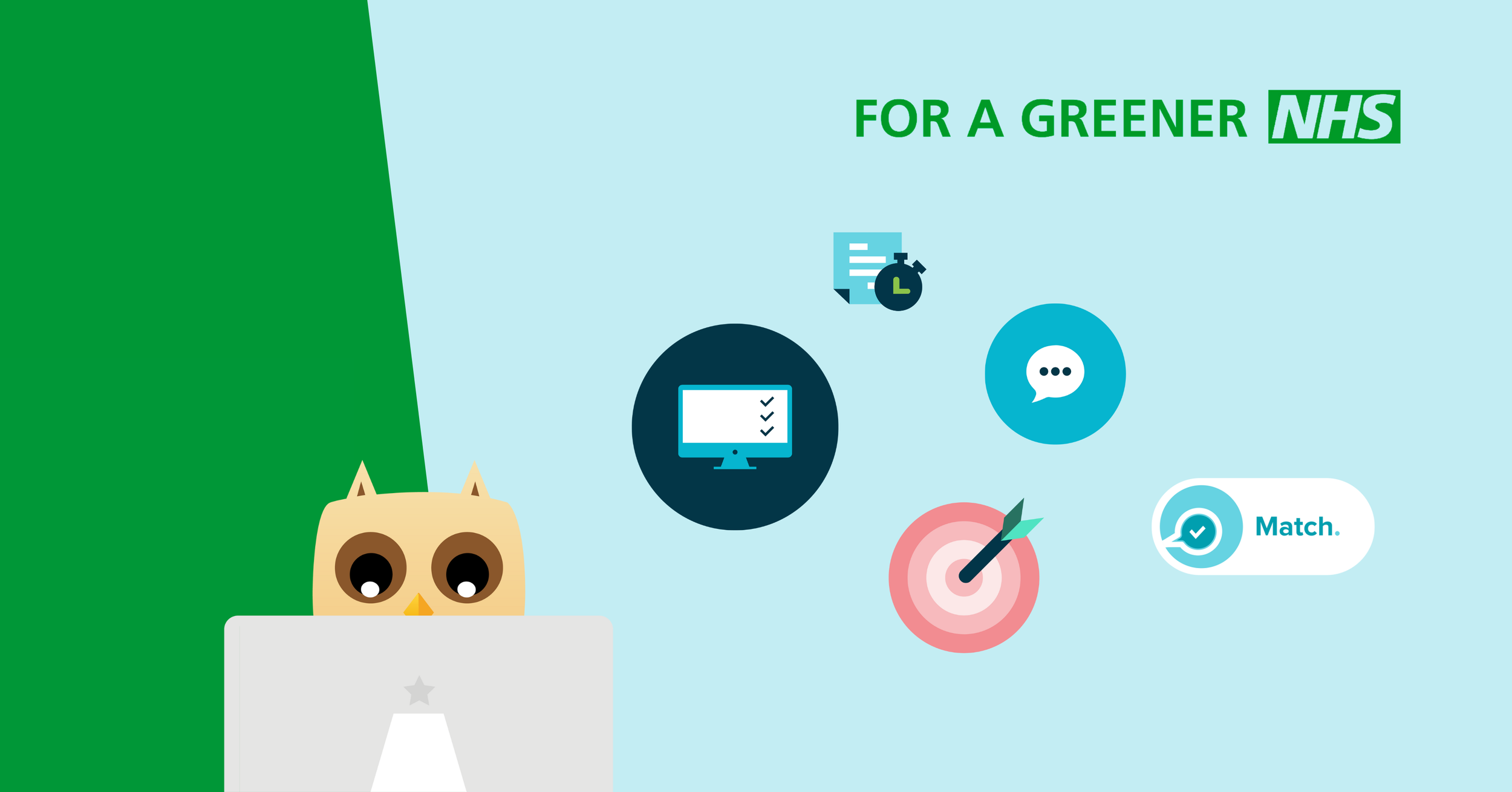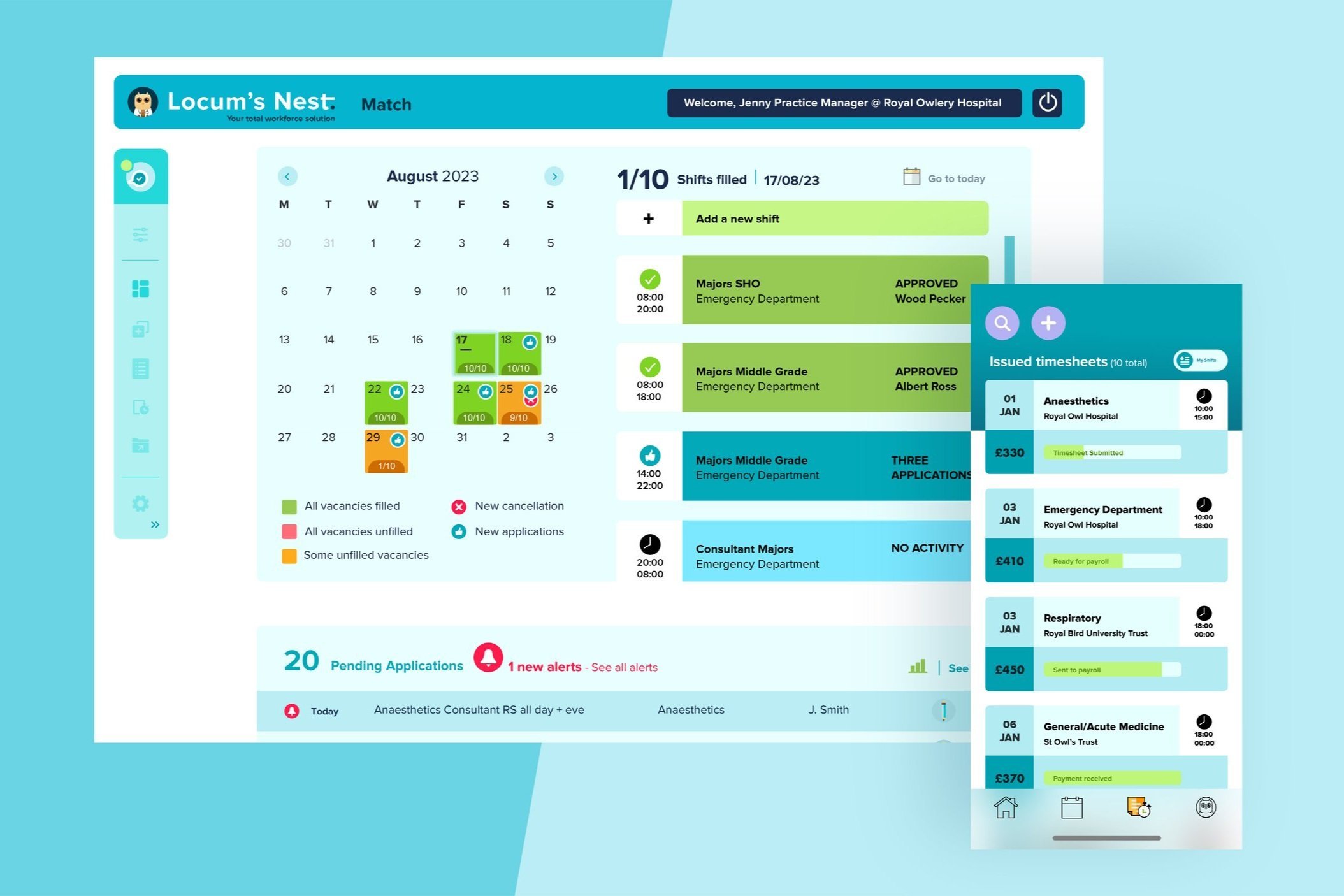Leveraging workforce technology for a greener NHS
The UK alone uses over 12.5 million tonnes of paper annually and with the NHS being the second largest employer in Europe, our national health service has the power to make a tangible difference to the future of our environment. The NHS is on a journey to adopt digital health solutions, which is key to its strategy as it recovers from the Covid-19 pandemic and plays an essential part in the NHS Long Term Plan published in 2019.
In this article, we show how NHS Trusts can use digital workforce solutions to work towards the NHS’s ambitious target of becoming net zero by 2045. Locum’s Nest workforce technology offers substantial benefits to NHS organisations by eradicating paper-based processes, digitising and simplifying processes - from recruitment and worker onboarding HR checks, to digitally matching vacant shift requests and e-timesheets. All this ultimately helps reduce CO2 emissions in the long term and supports the NHS on its journey to achieve net zero by 2045.
Here we take you through several ways NHS organisations can enhance their operational efficiencies, supporting their efforts towards their net zero journey, by using Locum’s Nest technology solutions.
1/ Say goodbye to paper timesheets and hello to e-timesheets
Via our flagship solution Match, the Locum’s Nest app matches healthcare professionals with vacancies, who then complete a shift and submit a timesheet - tracking its progress via the Locum’s Nest app.
Healthcare professionals can check their timesheet’ status via the loading bar, showing where in the process a timesheet is at. This cuts down on admin time for both healthcare professionals and management teams, as the digital solution answers the question of, ‘what’s going on with my timesheet?’
Switching fully to an e-timesheets process saves a significant amount of paper and time for all teams involved. It also cuts out the human error of losing timesheets between all the individuals they have to pass through in paper form, meaning healthcare professionals are less likely to fret over being paid on time, which also helps support staff morale/wellbeing. Moreover, because of the visibility and digital process, e- timesheets drastically reduce the number of payroll queries; saving precious time for payroll departments.
Recently, we worked with one NHS Trust that previously had a complicated process harmful to the environment. Timesheets at this Trust ended up in a collection box and were collected twice a week by a courier - simply not sustainable. The courier transported them by land to the airfield which then chartered 2 DHL flights weekly to fly the timesheets to Northern Ireland. Once the timesheets landed in Northern Ireland, they were collected by the land courier and shipped to the Trusts payroll provider's office. Positively, using Locum’s Nest, the Trust is now eradicating transport from/to airports and offices, and all 104 subsequent flights per annum, equating to 1 tonne of CO2 per year and 100 pine trees.
Even without this long process, simply eradicating paper and switching to e-timesheets is saving the equivalent of 100 pine trees, equating to 0.2 tonnes of CO2 can be saved. Imagine the impact of those savings if every Trust in the country was able to replicate that success!
2/ Eradicating paper via digitising compliance documents
With Locum’s Nest Digital PassportPlus, all communication forms can remain digital. Rota Coordinators can access a traffic-light safety checklist on their candidates’ credentials and follow up with candidates by messaging them directly on their mobile app during their onboarding process. If there was any missing paperwork, all of this can be submitted and received digitally, saving endless amounts of paper whilst also increasing efficiency. Healthcare professionals can then be notified at every stage, such as when licence statuses change or when approved for shifts. The technology allows Trusts to take ownership of their recruitment and be transparent with new workers, demonstrating a commitment to their well-being and communication from the get-go.
PassportPlus also works hand-in-hand with Match as our technology enables doctors to cross-cover shifts at neighbouring hospitals, which allows more clinicians on the wards without going through a lengthy administrative process. Doctors can easily drop required documents such as employment history and GMC records, creating a folder easily visible for hiring hospitals. A unique verification link ensures that HR compliance checks are completed instantly and safely, allowing users to join the staff bank quickly and without delay.
Reflecting on one of our current NHS Trust partnerships, we anticipate a further 20x reduction in paper needed at the Trust, as all compliance documents will become digital. To put this into numbers relating to sustainability, in the first 12 months alone, we will be helping the Trust save a further 20 tonnes of CO2 output!
3/ Say no to paper when enhancing communication and providing best-in-class resources for healthcare professionals
Healthcare professionals are under increasing pressure to deliver against the forever-changing demands to meet patient care guidelines. There are ways in which we can better support healthcare professionals in doing their job better against such changing priorities by centralising communications but doing so sustainably.
Initially, Locum’s Nest Community enabled managers to share crucial information (such as PPE changes and risk assessment surveys) with workers in seconds. But since its release in 2020, it has been developed to include surveys, onboarding tips, videos and any other key messages a Trust wishes to share with its whole workforce (not limited to full-time employees, but including bank and substantive workers). This is notably beneficial as healthcare professionals might be completing a range of hours, and whether working one-8 hour shift or 20 per month, healthcare professionals have exactly the same access, meaning there is no breakdown in communication, which then ensures synergy between hospital managers aiming to deliver key messages to healthcare professionals, remains high.
Recently, we asked healthcare professionals using the Locum’s Nest app a series of questions following up on the NHS Staff Survey 2021, enabling them to share their thoughts from their experience in the NHS All of this was completed digitally without the need for endless forms and best of all can be found in the same place as all other communication forms from management to healthcare professionals.
Healthcare professionals can also receive time-relevant information and support. Last year we released a series of blogs aimed at supporting healthcare professionals’ mental health through winter pressure with our partners Nourish, You Okay, Doc?, and Flexa Careers. All 50,000 healthcare professionals registered with the Locum’s Nest app could access this mental health content and even share or save their favourites to return to at a later date. If all of this were printed on paper for all 50,000 healthcare professionals, this would equate to approximately 300,000 pieces of paper, translating to roughly 30 pine trees!
Moreover, this enhanced level of communication has continued to be embraced and remains a day-to-day part of people management for hospital managers and rota coordinators. Healthcare professionals have fed back that this makes them increasingly included within the Trust, regardless of the regularity of shifts they take.
The NHS is on a journey to replace paper-based with digital processes, and we’re seeing many promising sustainable innovations reinventing communications pathways between healthcare professionals and patients. Yet, it is also crucial to build resilient and greener processes from within, especially when technology has the power to unlock efficiencies and lessen the admin burden.
___
Book a discovery call with one of our team to find out how innovative digital workforce solutions, developed by clinicians for clinicians, can support Trusts on their journey to hit the NHS’s goal of being net zero by 2045.



